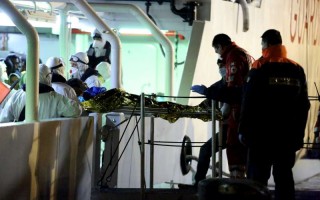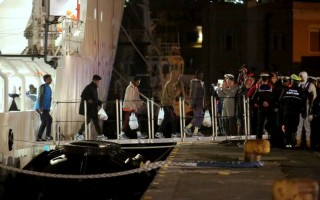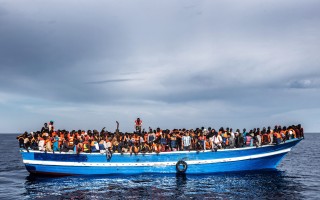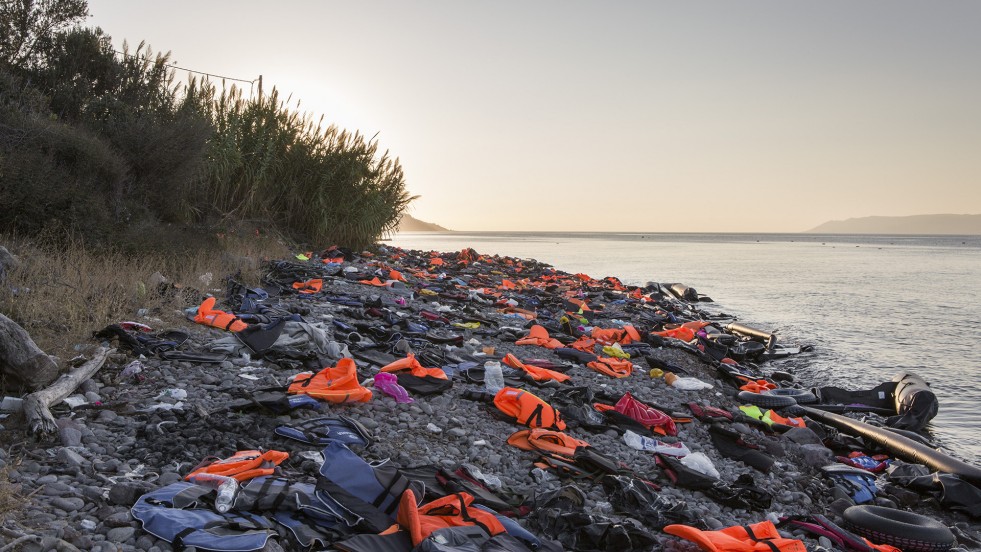
Discarded life jackets and inflatable boats litter a beach on Lesvos. © UNHCR / Ivor Prickett
They left in darkness. By morning, half of them were lost at sea, one confirmed dead.
Like thousands of others before them, this group of some 25 refugees believed the wars ravaging the Middle East posed a greater risk than boarding a small wooden boat at midnight on the Turkish coast. Destination: the Greek island of Lesvos, the frontier of Europe.
“The fear of staying in Syria and Iraq wins over any fears of hazards on the sea,” said Patric Mansour, a protection officer for the United Nations refugee agency.
Over 357,000 refugees have undertaken the perilous voyage to Greece this year, according to figures collected by UNHCR, with the largest surge—over 230,000—arriving since August.
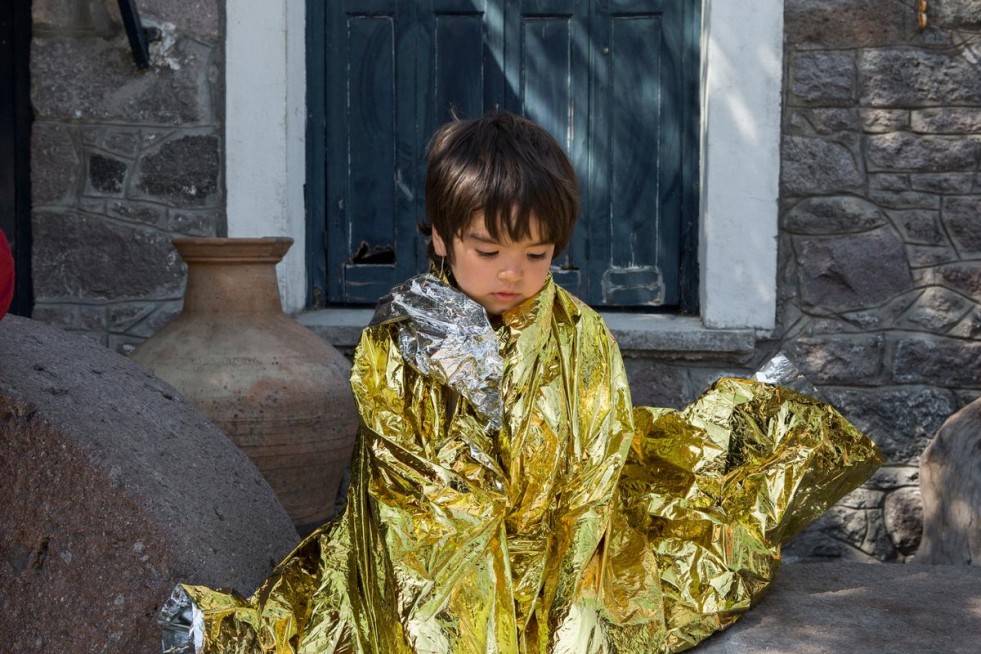
A young refugee boy from Afghanistan warms up with an emergency blanket after crossing from Turkey to the Greek island of Lesvos in an inflatable boat. © UNHCR / Ivor Prickett
Even as some European countries pull up the drawbridge, desperate people keep coming in search of refuge. They are undaunted by the challenge, literally arriving by the overstuffed rubber boatload.
The flow of people into Lesvos, the main entry point for refugees to Europe, has grown dramatically in the last few months.
“Compared to figures earlier in the summer, it’s almost doubled,” said Djamal Zamoum, senior emergency officer at UNHCR, on Sunday. “Yesterday we saw 6,000 in just one day.”
The crossing normally takes about 90 minutes, the length of a football match.
The beaches of this popular tourist island are littered with abandoned boats and life jackets, gleefully flung aside like skins of a former life.
But not all of them make it across this six-kilometre ribbon of water between Turkey and Lesvos. Just 35 minutes after leaving the Turkish coast, the engine aboard this group’s small wooden boat coughed and cut, survivors told UNHCR staff in a detailed debrief.
The crossing normally takes about 90 minutes, the length of a football match, and costs US$1,200 to US$1,400 per person. Children ride free.
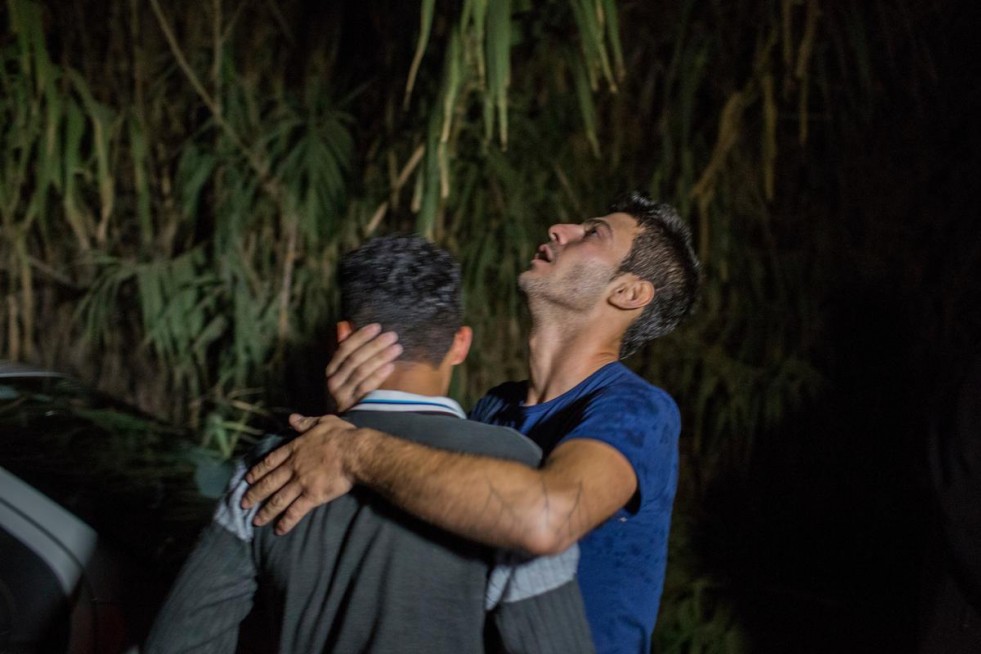
Two young men from Syria embrace after surviving the 90-minute journey from Turkey to the Greek island of Lesvos in an inflatable boat. © UNHCR / Ivor Prickett
Bobbing listlessly in the gloom, the men refilled the tank from a jerry can. The hatch of the engine compartment was left open.
The dinghies used to take 30–35 people. Now they take 50–55. They’re built for eight.
On arrival, some cry. Others praise God. Most rip open the plastic wrapping protecting their mobile phone and call family or pose for a selfie.
Waves crashed over the side of the wooden boat, filling the engine compartment with water.
“They were promised a large yacht. All they got was a tiny wooden boat.”
For one Syrian family—Lina, Tarek and their young daughters, Laya and Linette—this passage was part of a US$10,000 odyssey from Lebanon to Germany arranged by people smugglers in Beirut. They had haggled down the price from US$14,000.
“They were promised a large yacht,” said Mansour. “All they got was a tiny wooden boat.”
The water rose.
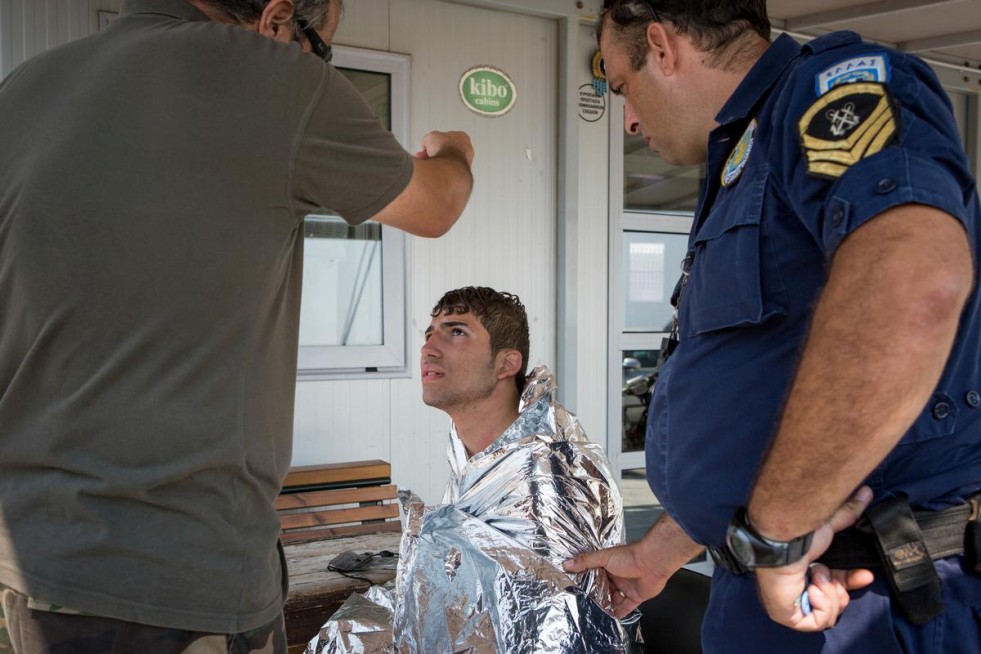
Ahmed, a Syrian refugee who was rescued from the sea, floated for about eight hours after the overcrowded boat he was travelling in sank. © UNHCR / Ivor Prickett
On September 14 the family had taken a ferry from Beirut to Marsin in Turkey, where they boarded a bus to Izmir. On September 18 they were instructed to take a taxi to a garage, and to hide their luggage behind plants in a nearby park.
Thirty minutes later they were hurried onto a bus and driven for four hours to a sandy beach.
Several refugees refused to board the vessel before it disembarked, saying it was too overcrowded.
Now, as the male passengers moved to try and bail the floundering vessel, it tipped and turned turtle. Many were trapped inside.
Tarek, the father of the family, found himself inside the small cabin. He swam out into the night air and gathered his wife and their youngest daughter, six-year-old Linette. Calling out in the darkness for eight-year-old Laya, they heard only silence.
Some men tried to right the boat in vain. It sank.
Calling out in the darkness for eight-year-old Laya, they heard only silence.
The family drifted under the stars with several other passengers for about four hours before arriving at a small, treeless island roughly 300 meters from the eastern shore of Lesvos.
At around 4:30 a.m., Romeo, a resident of a nearby fishing village, was chatting with friends on the quayside.
“I heard people shouting ‘help, help’. It was dark, I couldn’t see anything,” Romeo said.
He called the police.
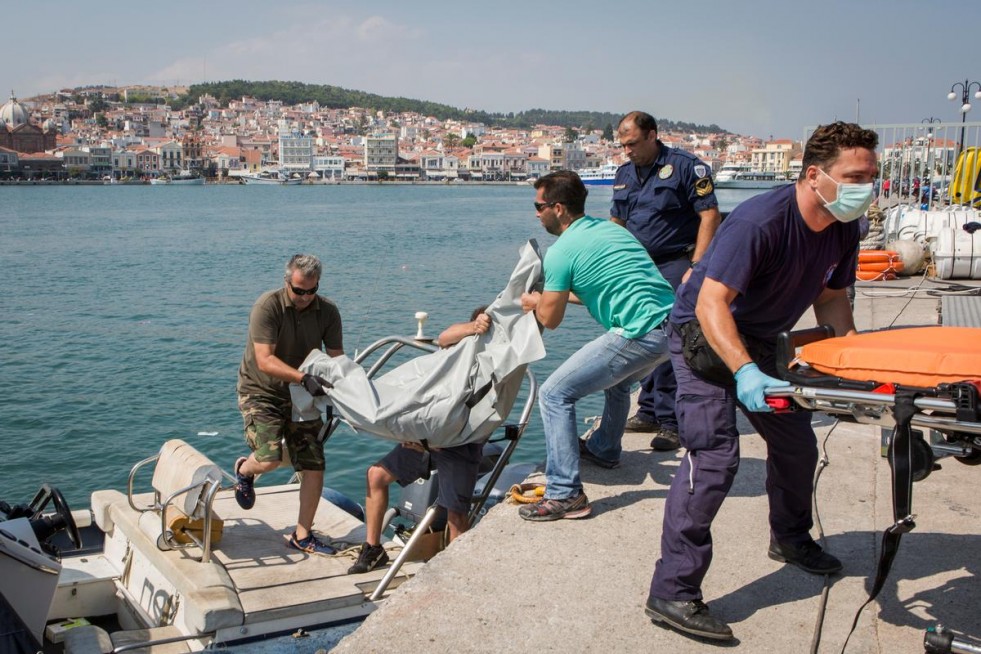
Greek coastguard officials, port police and paramedics lift the body of an unidentified drowning victim after a boat sank near the eastern coast of Lesvos. © UNHCR / Ivor Prickett
The exact timing is unclear, but three patrol boats, a navy ship and a Super Puma helicopter were dispatched, according to the Greek coastguard.
At 4:50 a.m. the coastguard patrol picked up 10 survivors, including the distraught family, and brought them to the island’s main town, Mytilene.
“A short while later, in the same area, a coastguard boat detected an unconscious, underage girl,” the coastguard said in a subsequent report.
“She’s not the first, and she won’t be the last. The people’s desperation wins over their fear.”
At the same time, another survivor was found in the water and later a land patrol picked up two more shipwrecked refugees, the coastguard said.
The coastguard continued to trawl the area.
“There were choppers circling around all day,” said Merav Avishai, who was holidaying with her family at a hotel overlooking the scene.
On the morning of September 19, young Laya was pronounced dead at the general hospital. Around a dozen people remained unaccounted for.
“It’s a tragedy for the family who lost a small girl, and UNHCR will continue to support them,” said Mansour, noting that the refugee agency provided medical and psychological support to survivors and grieving families as well as accommodation and other assistance.
“But she’s not the first, and she won’t be the last,” he added. “The people’s desperation wins over their fear.”



